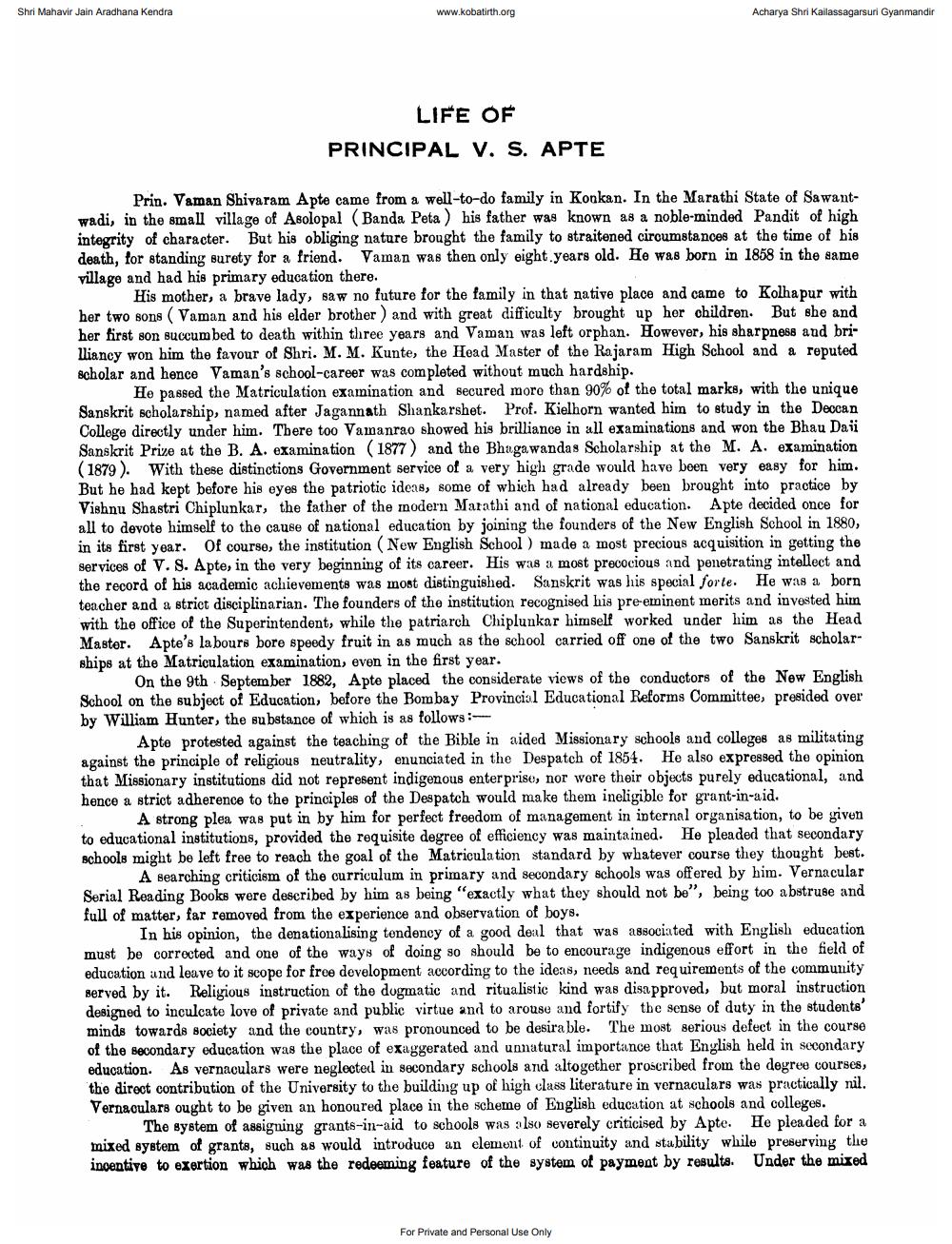________________
Shri Mahavir Jain Aradhana Kendra
www.kobatirth.org
Acharya Shri Kailassagarsuri Gyanmandir
LIFE OF PRINCIPAL V. S. APTE
Prin. Vaman Shivaram Apte came from a well-to-do family in Konkan. In the Marathi State of Sawantwadi, in the small village of Asolopal (Banda Peta) his father was known as a noble-minded Pandit of high integrity of character. But his obliging nature brought the family to straitened circumstances at the time of his death, for standing surety for a friend. Yaman was then only eight years old. He was born in 1858 in the same village and had his primary education there.
His mother, a brave lady, saw no future for the family in that native place and came to Kolhapur with her two sons Vaman and his elder brother) and with great difficulty brought up hor children. But she and her first son succumbed to death within three years and Vaman was left orphan. However, his sharpness and briVianoy won him the favour of Shri. M. M. Kunte, the Head Master of the Rajaram High School and a reputed scholar and hence Vaman's school-career was completed without much hardship
He passed the Matriculation examination and secured more than 90% of the total marks, with the unique Sanskrit scholarship, named after Jagannath Shankarshet. Prof. Kielhorn wanted him to study in the Deccan College directly under him. There too Vamanrao showed his brilliance in all examinations and won the Bhau Daii Sanskrit Prize at the B. A. examination (1877) and the Bhagawandas Scholarship at the M. A. examination (1879). With these distinctions Government service of a very high grade would have been very easy for him. But he had kept before his eyes the patriotic ideas, some of which had already been brought into practice by Vishnu Shastri Chiplunkar, the father of the modern Marathi and of national education. Apte decided once for all to devote himself to the cause of national education by joining the founders of the New English School in 1880, in its first year. Of course, the institution New English School made a most precious acquisition in getting the services of V. S. Apte, in the very beginning of its career. His was a most precocious and penetrating intellect and the record of his academic achievements was most distinguished. Sanskrit was his special forte. He was a born teacher and a strict disciplinarian. The founders of the institution recognised his preeminent merits and invested him with the office of the Superintendent, while the patriarch Chiplunkar himself worked under him as the Head Master. Apte's labours bore speedy fruit in as much as the school carried off one of the two Sanskrit scholarships at the Matriculation examination, even in the first year.
On the 9th September 1882, Apte placed the considerate views of the conductors of the New English School on the subject of Education, before the Bombay Provincial Educational Reforms Committee, presided over by William Hunter, the substance of which is as follows:
Apte protested against the teaching of the Bible in aided Missionary schools and colleges as militating against the principle of religious neutrality, enunciated in the Despatch of 1854. He also expressed the opinion that Missionary institutions did not represent indigenous enterprise, nor were their objects purely educational, and hence a strict adherence to the principles of the Despatch would make them ineligible for grant-in-aid.
A strong plea was put in by him for perfect freedom of management in internal organisation, to be given to educational institutions, provided the requisite degree of efficiency was maintained. He pleaded that secondary schools might be left free to reach the goal of the Matriculation standard by whatever course they thought best.
A searching criticism of the curriculum in primary and secondary schools was offered by him. Vernacular Serial Reading Books were described by him as being "exactly what they should not be", being too abstruse and full of matter, far removed from the experience and observation of boys.
In his opinion, the denationalising tendency of a good deal that was associated with English education must be corrected and one of the ways of doing so should be to encourage indigenous effort in the field of education and leave to it scope for free development according to the ideas, needs and requirements of the community served by it. Religious instruction of the dogmatic and ritualistic kind was disapproved, but moral instruction designed to inculcate love of private and public virtue and to arouse and fortify the sense of duty in the students' minds towards society and the country, was pronounced to be desirable. The most serious defect in the course of the secondary education was the place of exaggerated and unnatural importance that English held in secondary education. As vernaculars were neglected in secondary schools and altogether proscribed from the degree courses, the direct contribution of the University to the building up of high class literature in vernaculars was practically nil. Vernaculars ought to be given an honoured place in the scheme of English education at schools and colleges.
The system of assigning grants-in-aid to schools was also severely criticised by Apte. He pleaded for a mixed system of grants, such as would introduce an element of continuity and stability while preserving the incentive to exertion which was the redeeming feature of the system of payment by results. Under the mixed
For Private and Personal Use Only




